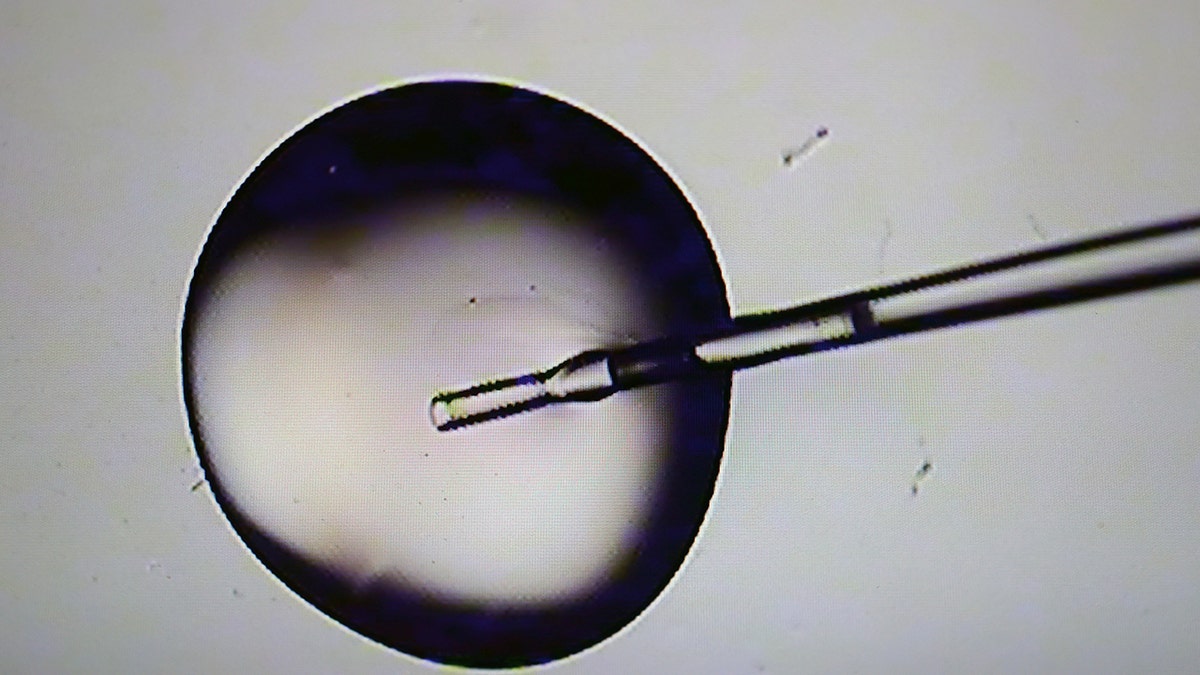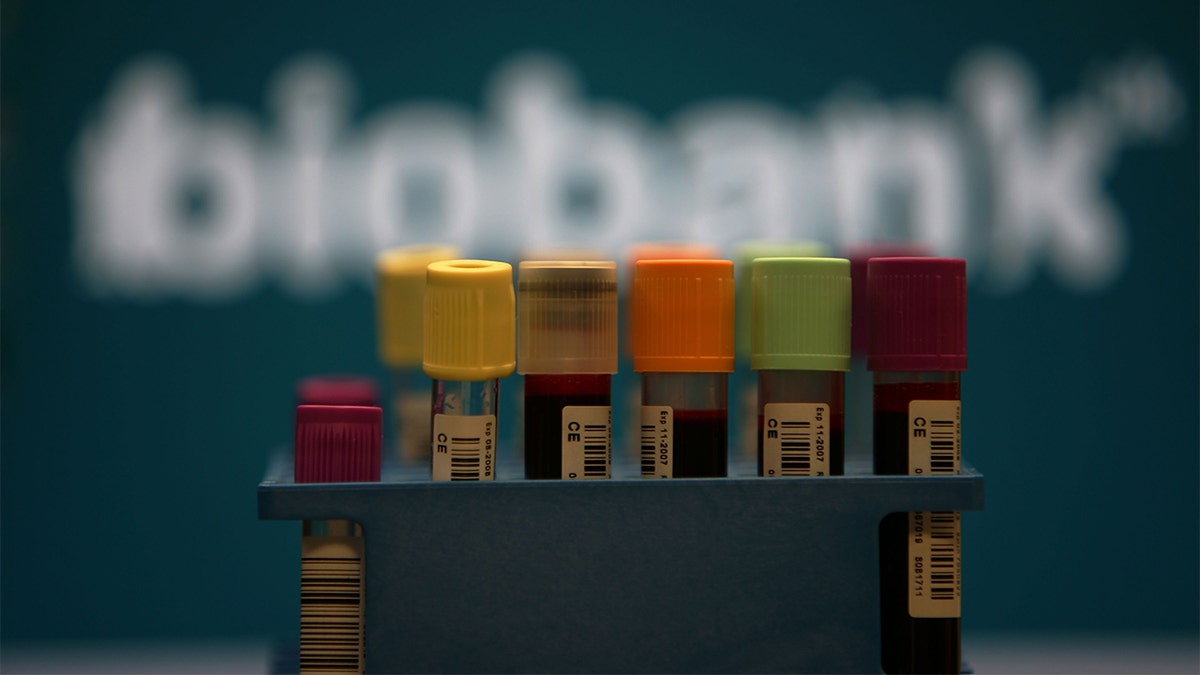
A U.S. startup company is reportedly offering wealthy couples the chance to screen their embryos for IQ and other favorable genetic traits, which has raised ethical concerns.
Heliospect Genomics is charging up to $50,000 to test 100 embryos and claims their technology can help couples undergoing IVF pick children with IQ scores six points higher or more over babies conceived naturally, The Guardian reports.
The company has already worked with more than a dozen couples, undercover video footage reviewed by the outlet reveals.
“Everyone can have all the children they want, and they can have children that are basically disease-free, smart, healthy; it’s going to be great,” CEO Michael Christensen said on a video call in November 2023, according to the report. The call was recorded by an undercover researcher for Hope Not Hate, an antifascist group that works to “expose and oppose far-right extremism.”
DESIGNER BABIES MAY BE ‘MORALLY’ ACCEPTABLE, UK ETHICS COUNCIL DECIDES

A microscopic view of a cryo solution during embryo prep in the IVF lab at Brigham & Women’s Hospital. (David L. Ryan/Boston Globe via Getty Images)
On the call, Heliospect employees reportedly walk prospective parents through the experimental genetic selection techniques advertised by the company. One employee explained how couples could use polygenic scoring to rank up to 100 embryos based on “IQ and the other naughty traits that everybody wants,” including sex, height, risk of obesity and risk of mental illness, according to The Guardian.
Heliospect says its prediction tools use data from UK Biobank, a publicly funded genetic repository with half a million British volunteers. The database permits approved researchers and scientists around the world to access it for “health-related research that is in the public interest.”
United Kingdom law prohibits parents from selecting embryos on the basis of predicted high IQ, but the practice is currently legal in the U.S., even if the technology is not yet commercially available.
Expert geneticists and bioethicists told The Guardian the prospect of selecting embryos for favorable genetic traits is ethically questionable since it could reinforce the idea of “superior” and “inferior” genetics. Hope Not Hate went further in its own reporting, tying a handful of Heliospect employees to people and publications that have purportedly promoted so-called scientific racism, or the contested belief that human races have innately different levels of physical, intellectual and moral development determined by their genetics.
TRUMP PLEDGES COVERAGE FOR IVF TREATMENT

U.S.-based startup Heliospect Genomics claims it can help parents screen embryos to predict higher intelligence and other desirable genetic traits. (iStock)
Katie Hasson, associate director of the Center for Genetics and Society in California, warned in comments to The Guardian that embryo selection technology could mainstream “the belief that inequality comes from biology rather than social causes.”
Heliospect Genomics did not immediately respond to Fox News Digital’s request for comment.
Heliospect managers told The Guardian the U.S.-based company operates within the bounds of all applicable law and regulations. The company said it is currently in “stealth mode” and is still developing its services before a planned public launch. They added that couples who have screened fewer embryos were charged around $4,000 for the service.
On the calls recorded by Hope Not Hate, Heliospect’s team described how its “polygenic scoring” service uses algorithms to analyze the genetic data given by parents to predict the specific traits of their individual embryos. The company does not offer IVF services, according to The Guardian.
Christensen presented an ambitious vision for how the technology could develop, even suggesting that “lab-grown eggs would allow couples to create embryos on an industrial scale – a thousand, or even a million – from which an elite selection could be handpicked,” the report said.
According to The Guardian, he suggested that future technology might be able to screen for personality types, including what he referred to as “dark triad” traits, namely machiavellianism, narcissism and psychopathy.
AI BABIES: NEW TECHNOLOGY IS HELPING FERTILITY DOCS CHOOSE THE BEST EMBRYOS FOR IVF

Blood samples taken from volunteers are labeled and ready to be stored at the UK Biobank on April 17, 2007, in Manchester, England. (Christopher Furlong/Getty Images)
“Beauty is something lots of people actually ask about,” he reportedly added.
Heliospect told The Guardian it does not condone industrial-scale egg or embryo production or elite selection and that it does not plan to offer personality screening services.
Among Heliospect’s senior staff is Jonathan Anomaly, a controversial academic who has defended so-called “liberal eugenics,” or the idea that parents should use genetic technology to enhance their children’s prospects.
Anomaly told The Guardian that as a professor of philosophy, he has published provocative articles intended to stimulate debate and that “liberal eugenics” was an accepted term by bioethicists.
Records show Heliospect gained access to UK Biobank’s data in June 2023. In its application, the company said it planned to use advanced techniques to improve the prediction of “complex traits.” But Heliospect did not disclose screening embryos as an intended commercial application or mention IQ, The Guardian reported.
CLICK HERE TO GET THE FOX NEWS APP
UK Biobank told the outlet Heliospect’s use of its data appeared to be “entirely consistent with our access conditions.”
Experts suggested to The Guardian that restrictions on access to databases like UK Biobank may need to be strengthened in light of the ethical concerns around embryo screening.
“UK Biobank, and the UK government, may want to think harder about whether it needs to impose some new restrictions,” said professor Hank Greely, a bioethicist at Stanford University.
Heliospect emphasized that its use of UK Biobank data is lawful and complies with relevant regulations. The company told The Guardian it supports addressing concerns about preimplantation embryonic screening through public education, policy discussions and properly informed debates about the technology, which it strongly believed had the potential to help people.





















